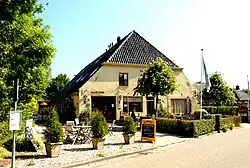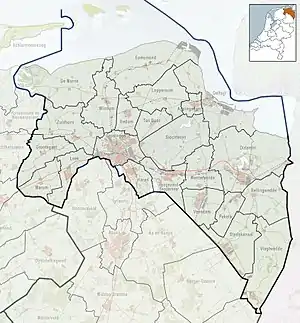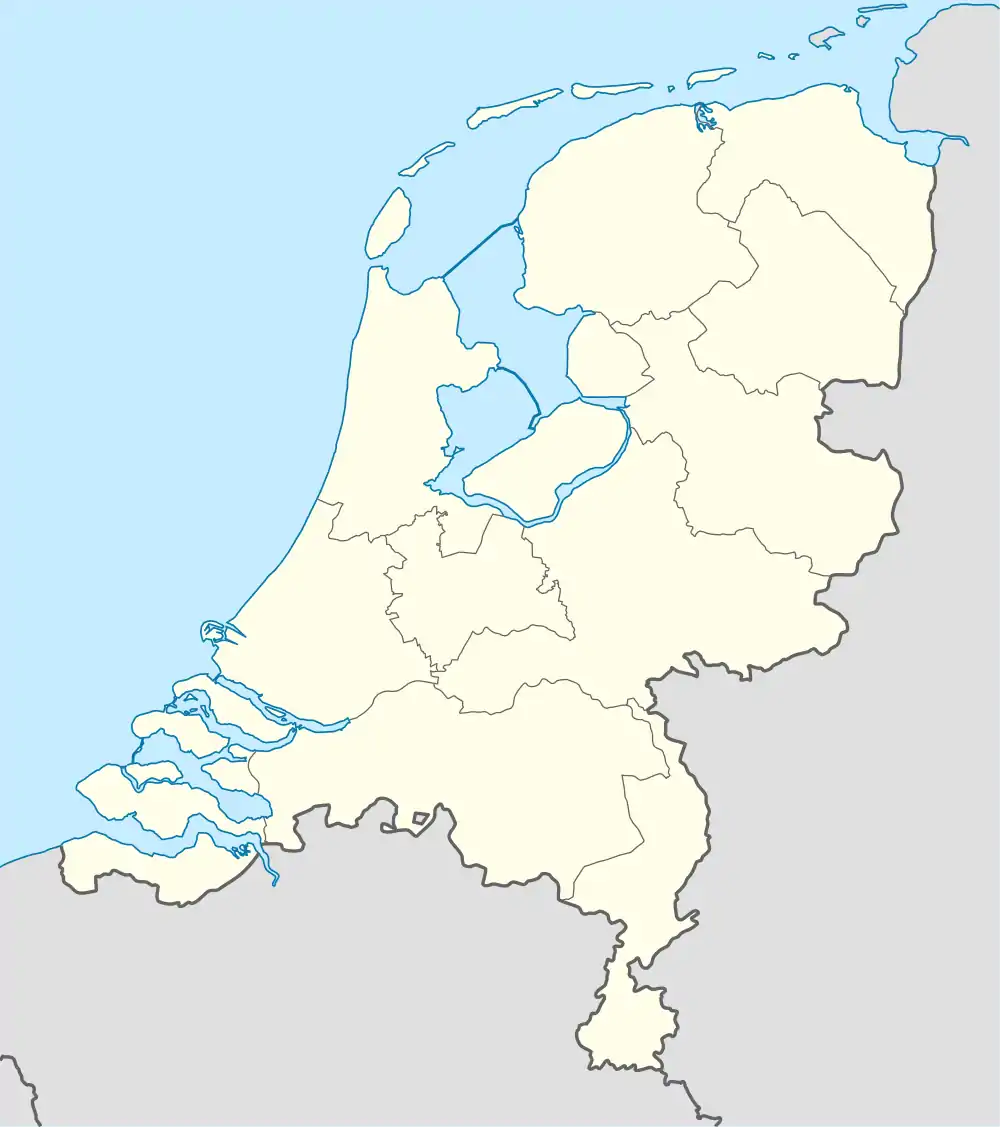Westernieland | |
|---|---|
 De Oude Smidse in Westernieland | |
 Westernieland Location in province of Groningen in the Netherlands  Westernieland Westernieland (Netherlands) | |
| Coordinates: 53°24′01″N 6°28′51″E / 53.4002°N 6.4808°E | |
| Country | Netherlands |
| Province | Groningen |
| Municipality | Het Hogeland |
| Area | |
| • Total | 0.88 km2 (0.34 sq mi) |
| Elevation | 1 m (3 ft) |
| Population (2021)[1] | |
| • Total | 230 |
| • Density | 260/km2 (680/sq mi) |
| Time zone | UTC+1 (CET) |
| • Summer (DST) | UTC+2 (CEST) |
| Postal code | 9969 |
| Dialing code | 0595 |
Westernieland (Gronings: Westernijland) is a village in the Dutch province of Groningen. It is part of the municipality of Het Hogeland. The village is located near the Wadden Sea.
History
Around 1000, the village of Mariaburen was founded on a sand ridge near the Wadden Sea.[3] Westernieland was sometimes referred to as Mariaburen in den Nijenlanden (Mariaburen in the new lands),[4] however it is unclear whether it is the same village. Around 1350, a dike was built.[3] The village was first mentioned in 1406 as Inden Nyen Lande (in the new land). Later "west" was added to distinguish itself from Oosternieland to the east.[5] The church contains 14th century parts, however the main construction is from 1831.[6]
Due to the proximity to the Wadden Sea, the village was flooded several times.[7] The worst flood was the Christmas Flood of 1717 when only four of the 50 houses were still habitable, and 78 people died.[4] The church remained standing, but contained two metres of water.[3] Westernieland was rebuilt on higher ground which explains the detached location of the church.[4] In 1795, it became part of the municipality of Pieterburen.[8] In 1840, the population was 500 people.[7]
Even though Pieterburen, the main village, is nowadays known for the Seal Rehabilitation and Research Centre, the economy was partially based on seal clubbing.[7] The last sealer in the Netherlands was Ko Teerling from Westernieland.[3] During his best season, he had killed 600 seals. Later limits were imposed, and it was declared illegal in 1957.[9]
In 1939, an unemployed camp was constructed near the village for a poldering project. From 1945 to 1947, it served as an internment camp for members of the NSB (Dutch Nazi party).[6] Up to the 1970s, Westernieland was a lively community with shops. Since then, it has lost its retail and the school has closed down.[7] In 2019, it became part of the municipality of Het Hogeland.[7]
Westernieland is one of the starting points for wadlopen (mudflat hiking). At low tide, it is possible to walk to the island of Schiermonnikoog.[10] Mudflat hiking is potentially dangerous, and is only allowed under the supervision of a licensed guide.[11]
Notable people
- Freek de Jonge (born 1944), cabaret performer and writer[12]
Gallery
 Church of Westernieland
Church of Westernieland Bar in Westernieland
Bar in Westernieland The barracks of the unemployed camp
The barracks of the unemployed camp_(2775287644).jpg.webp) Mudflat hiking near Westernieland
Mudflat hiking near Westernieland
References
- 1 2 "Kerncijfers wijken en buurten 2021". Central Bureau of Statistics. Retrieved 8 March 2022.
Westernieland + Kaakhorn
- ↑ "Postcodetool for 9969PA". Actueel Hoogtebestand Nederland (in Dutch). Het Waterschapshuis. Retrieved 8 March 2022.
- 1 2 3 4 Emmy Wagenaar Hummelinck. "Robbenjagers en monnikenwerk in Westernieland". De Verhalen van Groningen (in Dutch). Retrieved 8 March 2022.
- 1 2 3 "Kerk Westernieland". Protestants Community Winsum-Halfambt (in Dutch). Retrieved 8 March 2022.
- ↑ "Westernieland - (geografische naam)". Etymologiebank (in Dutch). Retrieved 8 March 2022.
- 1 2 Redmer Alma (1998). Pieterburen (in Dutch). Zwolle: Waanders Uitgevers. p. 186. ISBN 90 400 9258 3. Retrieved 8 March 2022.
- 1 2 3 4 5 "Westernieland". Plaatsengids (in Dutch). Retrieved 8 March 2022.
- ↑ "Bekendmaking". Ommelander courant (in Dutch). 2 August 1796. Retrieved 8 March 2022.
- ↑ "Mee op robbenjacht (interview with Ko Teerling)". Nieuwsblad van het Noorden (in Dutch). 12 March 1983. Retrieved 8 March 2022.
- ↑ "Pieterburenwad zwerftocht". Wadlopen met Wim Spijk (in Dutch). Retrieved 8 March 2022.
- ↑ "Verordening van 13 december 1995, houdende regels met betrekking tot het wadlopen (Wadloopverordening 1996)" [1996 law for mudflat hiking] (PDF). Waddenzee (in Dutch). 13 December 1995. Retrieved 8 March 2022.
- ↑ "Profiel: Freek de Jonge". De Groene Amsterdammer (in Dutch). 1 March 2000. Retrieved 8 March 2022.